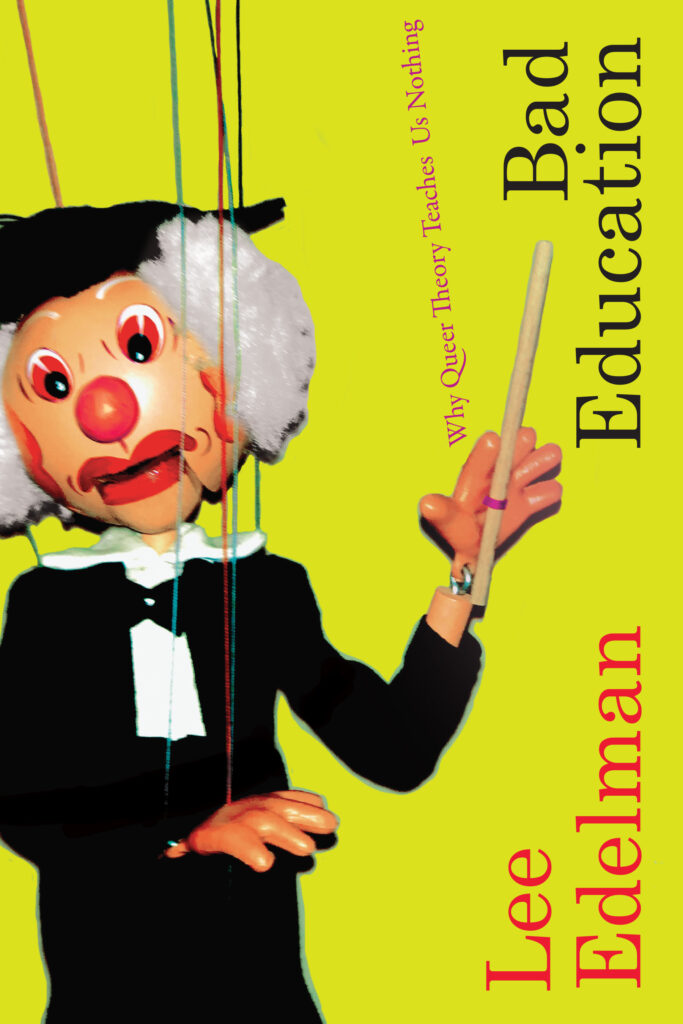
Is zero a number? 0 is the exception to many numerological rules. A number cannot be dived by 0, and any product of 0 is also 0. Unlike every other mathematical symbol, adding or subtracting by 0 does nothing. It’s neither positive nor negative, not even nor odd. It fails to be a number in every way. And yet, the value of 1, 2, and all the rest is determined by their distance from 0. Without the null value, we would be missing something integral to our understanding of math. 0 has to be thought alongside every and any number. It is the thing included in the category of “number,” a thing integral to that category, only because it is excluded from number-hood.
But enough about numbers. That’s not why you here. Yet, this paradoxical number-ness of 0 is the basis of Lee Edelman’s argument in his new book Bad Education. For Edelman, what is true of numbers is also true of language. Just as numbers gain their value from their relationship to 0, words gain their meaning by their relationship to objects and experiences that are outside of language. A physical chair is not a word, it is outside language. Yet the word “chair” gains its meaning in reference to the physical object. And that gap in communication between the chair I’m sitting in as I write this, with all its fine details and oddities, and the image that “chair” conjures in your mind correlates to void, the non-value of 0. Edelman dubs this gap, this place where words don’t go, queerness.
Unlike with 7, few are afraid of 0. And yet, the concept it represents is very frightening. It’s terrifying to imagine the balance of your bank account reading all 0’s. It’s terrifying to imagine your grade on test being that lonely, lonely value. The concept of the void, of nothingness is existentially terrifying too, be it the fear of the vacuum of outer-space or black holes or of the unknown place that comes after death. These are all deep-seated and common fears, and they point to scariness of the void of language. To deal with them and the way they constitute the realm of language and meaning itself, Edelman asserts that certain kinds of people are made to represent this void in language, are forced to become symbols of that which cannot otherwise be talked about. Queerphobia, then, is not so much about the fear or disgust society may hold for specific sexual practices. Instead, it is the product of certain people becoming embodiments for the “0” of language, a terrifying void that must be patched up.
But I’m afraid that I’ve misspoke. This entire argument up until this point is not Edelman’s argument in Bad Education. Rather, this is the line of inquiry that Edelman has pursued for the past 19 years, most famously inaugurated by his book No Future. Bad Education, instead of reinventing the wheel and trying to make 1 from 0, is Edelman’s most holistic expansion of his unique critical to project to date.
His concern is less with the description of the void of language and more with what do in the face of the resulting violence. After all, any solution you could think up would only replicate the problem: it would be within the realm of language and unable to patch up its constituent outside. Instead, Edelman offers a series of arguments relating strategies of communicating or teaching this gap, of constructing the eponymous bad education that allies itself with queerness and its voidlyness.
What’s so exciting about Bad Education is that a number of other academic have similarly taken up the question of the place where words don’t go in the intervening years between No Future and now. This book gives Edelman the opportunity to hash-out the relationship between other forms of being that similarly seem to be literalizations of the gap in language, namely blackness and womanhood (and sometimes, but not always, transess). The best arguments and the most fiery prose in the book are Edelman’s response to academics who have responded to his prior thoughts. Whether it’s flouncing his critics or deftly responding to some of his proponents, these sections give an impression of a thorough and principled philosophical stance. Although the complete apolitical and anti-identitarian nature of his arguments are bound to be controversial, no one can claim that Edelman does not stick to his guns and defend his position as persuasively as he can.
What remains is the continued exploration of the history and social constructions of the various “0”s of language (particularly the odd place of transness within Edelman’s book) and the impossible task of communicating what lies outside of thought.
— Matthew Mason

“I think my home lies in moments.”
Jennifer Huang’s Return Flight winds itself through retrospection and introspection throughout the fault lines of the home, the body, and the self. Huang writes, “what I know is what I imagine,” and what they know is the elaborate mythologies and topographies of Taiwanese folklore wrapped in an intimate portrait of family history. In shapeshifting gods and spirits, the poems find beauty in the past and probes the meaning of our physicality. Celebrating their culture and questioning the self, Huang’s poems travel the length of their lineage up to the present day, framed by memories and moments. In the tempo of “beating hearts / through objects passed down,” Huang allows us entrance into the aching feeling of not knowing what to call home—not knowing where to turn to in the strange quiet of the night—and how it weighs on the body.
However, Return Flight departs from melancholy and enters into the complexities of beauty and desire through a gentle yet attentive voice. And the place we land is comfortable: where an orange’s sweet stickiness sticks underneath your fingernails, where you wake to the stinky but welcome smell of chou doufu, and where two papayas touch outside the window. As the year of the rabbit comes upon us, turn to Jennifer Huang’s brilliant voice to remember what it means to ask for home and how it feels once you find it.
–Ashling Lee